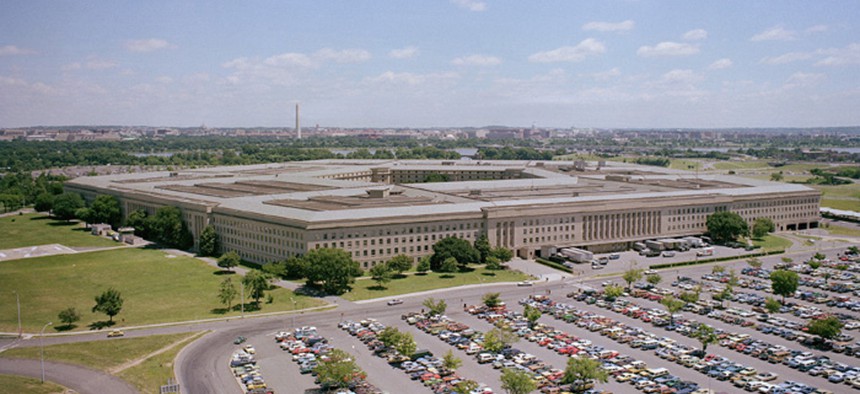Security Insiders: Defense Budget Cuts Put the Military on a Dangerous Course
The planned cuts leave the military too few resources to fight, experts say.
The planned cuts to the Pentagon's budget put the U.S. military on a dangerous course with too few resources to fight, a majority of National Journal's National Security Insiders said.
"The threat is increasing as our defenses atrophy," one Insider said. "Nation-building at home is not a national security strategy."
The Pentagon's $496 billion budget request proposed a series of controversial cuts to meet the budget caps Congress imposed to reduce federal spending. Defense officials have warned even tougher choices will come with steeper reductions the following year, and National Journal's pool of national security experts are balking at some of the planned reductions.
"Cutting the Army drastically will jeopardize our ability to fight an unforeseen ground war," one Insider said.
Russia's incursion into formerly Ukrainian Crimea should be a wake-up call, several Insiders said, about unpredictable threats in the future. "The U.S. has to be prepared for all types of conflict," one Insider said, "even the Cold War kind that we thought had been consigned to the ash heap of history."
A significant 44 percent minority disagreed, saying the defense budget cuts put the military on an acceptable path with its changing mission after an era of war in Iraq and Afghanistan.
The defense budget, one Insider said, will be "at unprecedentedly high peacetime levels, and, even with [Budget Control Act]-level funds, well above the Cold War defense budget average, in constant dollars. Totally acceptable."
Do the defense budget cuts put the U.S. military on an acceptable path with the changing mission after an era of war, or on a dangerous course with too few resources to fight?
(64 votes)
- Dangerous course 56%
- Acceptable path 44%
Dangerous course
"The Pentagon's plan accepts the right degree of risk, but sequestration poses real dangers for America and the world."
"The sequestration budget is harming our future strategic posture in many ways, which will end up skewing our future policy choices. There is linkage between the perception of America's military strength and the actions of belligerents. A strong special-ops force is relatively cheap and looks good for movie plots. But this won't scare or deter a Russia, China, Iran, or North Korea."
"The cuts mean that we cannot afford to maintain our deterrent in both the Middle East and East Asia. The budget did not even consider Europe. How can we expect to maintain stability in all three?"
"The DOD could sustain current capabilities—and perhaps even thrive—if Congress made significant cuts to the most wasteful spending items, like base infrastructure. But Congress's refusal to repeal sequestration means that the Pentagon will be forced to make mindless cuts that will leave us ill-prepared for future contingencies."
"The DOD budget is fiscally driven. The QDR is a bad joke. Perhaps [Russian President Vladimir] Putin will shake them out of their lethargy but likely not."
"Cuts in defense spending are dangerous as long as DOD must fund bloated personnel and physical infrastructure costs. If Congress allowed DOD to manage its resources efficiently, spending could be reduced."
"All of the defense cuts in place and planned are so limiting our military capability that Putin will likely conclude that we are not in any position to stop his efforts. There will be other potential aggressors throughout the world as we withdraw from our previous role of being the shining light on the hill for countries that want to see freedom and democracy."
"No matter the strategy, the money just isn't there like it once was, but these defense cuts (combined with other American disengagement) are truly destabilizing."
"The QDR and the budget don't match. One is full of grand objectives about global leadership and rebalancing while the other provides little resources with which to attain those objectives. There is a strategic imbalance between the two."
"Clearly dangerous—even so, we may have to live with it."
"Some retrenchment is in order, but there is no rhyme or reason to the wholesale cuts being made in defense spending today. The United States will rue the day it went down this path with so little strategic consideration."
"Four percent of GDP is an easily defensible spend given the U.S.'s role in the world, changing and growing global threats, NATO's unilateral disarmament, and our weak Asian allies. Anything less may be politically expedient but dangerous in the face of a growing peer threat such as China."
"The military is already there. This is not a future proposition but current consequence."
"We do this after every major conflict—have some kind of peace dividend that fouls up our capabilities. The Obama people combine this with a feeling of dismissive toward foreign policy and we are digging our next president a big hole from which to climb."
"The U.S. has global vital interests confronted by global threats; Putin provides a timely wake-up call."
"Sequestration cuts are creating a 'credibility gap' between America's leadership role and its ability to actually lead. This path is fraught with danger as allies question U.S. willingness to defend their interests and as adversaries take greater risk (and potentially miscalculate) in further their own interests."
Acceptable path
"The military downsizing path is acceptable with proper risk management. Unless Americans agree to provide additional resources, there is no alternative to cutting the defense budget. Some in the political class seem willing to cut defense disproportionately until their demands for deep domestic spending are met. That tactic is risky, and may become dangerous if the world situation continues to unwind."
"I'd like a third option. The path is potentially acceptable, but only if Congress approves key changes like slowing down the rate of increase in military pay and benefits as well as authorizing another round of base closures. If Congress balks, they are the ones responsible for moving toward a 'dangerous course.' "
"We should avoid further land-mass warfare and especially any hare brained "nation building."
"What fights do people have in mind?"
"The problem is not the level of resources, it's how those resources are being spent. If the Defense Department could get the changes it is pursuing in key areas— military compensation, [base closures], retiring legacy weapons, etc.—it could field a suitable force within the budget constraints Congress has agreed to."
"Hardware matters less immediately—unless air and naval assets are degraded to an extent that we cannot exert any presence at all. Statecraft matters more. The debate is too simplistic and too 'obvious'—playing to defense acquisition lobbies."
"If we put some of that money into fixing our other woefully broken and underfunded instruments of foreign policy strength: infrastructure at home so we do not look to foreign visitors like a broken country; diplomatic heft; and a radically reformed development apparatus."
"What we need to do is update our national strategy—what's our goal? Only then cam you figure out the right amount of resources required."
"It all depends on Congress. The budget proposal assumes Congress won't take its own nonstrategic hatchet to the whole thing, or put back in things that are not needed."
"Significant additional restructuring, consolidation, acquisition reform, and base closing are needed in order to bring defense spending into proportion with our other national priorities."




